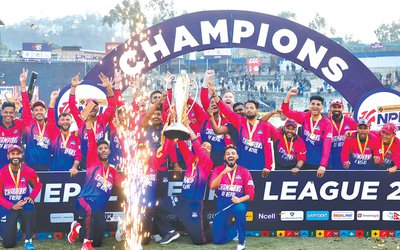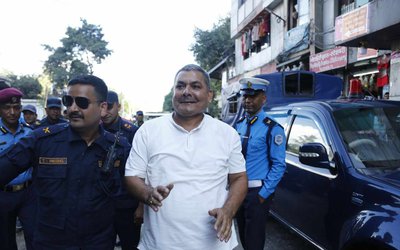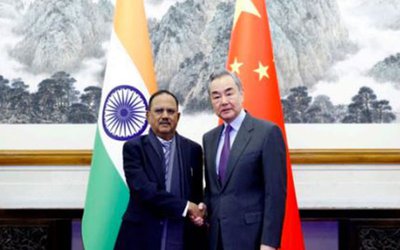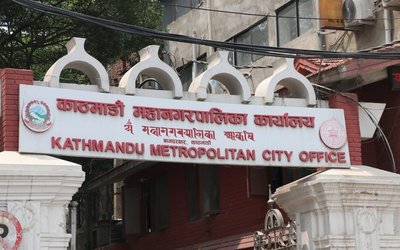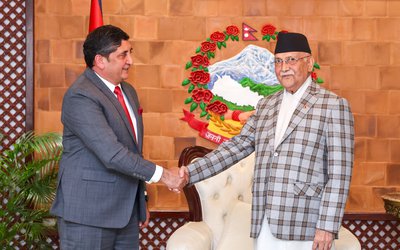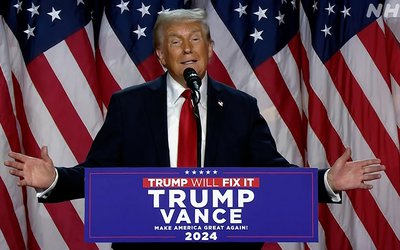Some leaders of the Nepali Congress have said that the recent alliance between the Unified Communist Party of Nepal-Maoists (UCPN-M) and the United Democratic Madheshi Front (UMDF), which catapulted Maoist Vice-Chairman Baburam Bhattarai to the highest seat of executive power , was based on an 'unholy' political alliance. But so far, there has been no discussion in the Nepali politics about what makes an alliance holy or unholy. Almost all the leaders suffer from what can be called a partial dementia: forgetting what one said in the past blissfully.
Not long ago, Baburam Bhattarai said the Communist Party of Nepal-Unified Marxist Leninist (CPN-UML) needs to disclose its 'gender'. He was being sarcastic and what he meant to convey was that UML lacks guts and characters to take major decisions this way or that way but he said that at the cost of a sexual minority largely boycotted by the society. But today, Bhattarai, in company of his Party Chief Prachanda, keeps visiting the UML leaders as if they are the high priests of Maoists’ political pilgrimage.
During the elections to the constituent assembly, Prachanda told the masses time and again that Nepali Congress deserved a big kick on their 'ass' . "They cannot be our allies, they came to us after King Gyanendra kicked them, and had nowhere to go."
Sushil Koirala, the leader of the Party that deserved the 'kick' is another high priest of Nepali politics that Bhattarai and Prachanda keep regularly prostrating before. The frequency of their visits to Koirala and UML leaders has increased after Bhattarai entered into the so-called unholy alliance with the UDMF on the basis of a secret pact on power sharing.
Apparently, the Maoist attempt to rope in Nepali Congress is the first serious attempt to get their support after the Party gave a decisively mortal blow to G P Koirala's ambition to become the first President of Republic Nepal four years ago. Koirala died a dejected man with his ambition unfulfilled. The UCPN-M had clearly ditched him, especially in the context of a 'gentlemen 's agreement' that they would support Koirala's candidature for the President's post in lieu of Nepali Congress endorsing the ‘pro-republic agenda' which Koirala did in 'good faith' but with his eye and ambition firmly set on Shital Niwas.
Clearly, that was an unholy alliance which was buried with equal unholiness by the Maoists. What constitutes holiness in politics? Clearly, supremacy of people's and national interests over individual and partisan interests. It needs to be transparent, pursued in the best interest of the nation and its people, and that who leads should be decided after the agenda in the interest of the nation or decided, again openly and transparently.
But how many times has this criteria been met in our context. The 12-point agreement was signed, and left for the Maoists to make its interpretation. Making promises and getting concessions from the people, but not implementing them with the desired seriousness is another example of 'unholiness' in Nepali politics.
It was agreed to have the fate of the 'Monarchy decided' by the first meeting of the constituent assembly, but the parliament that King Gyanendra had revived invoking the doctrine of necessity --a condition to end the 2006 April agitation under which King would hand over power to the Political parties--amended the constitution illegally, and the CA's first meeting took that dictate and acted in haste and unconstitutionally. The 'unholiness' of intent behind the 12-point agreement was exposed especially after the mediators and the other actors like the Nepali Congress and the UML accepted Maoist interpretation in totality.
There are also too many other sides of the 'unholiness' in the manner and content of Nepali Politics. Let's take the example of the 4-point agreement that says that Bhattarai government will withdraw all cases against Maoist leaders and actors during the years of conflict, along with those labeled against Madhesi activists during the Terai agitation. But Prime Minister Bhattarai 'misinterpreted' it saying that the government will simply investigate the circumstances under which such cases were lodged, and will consider withdrawing if they were implicated falsely. Prachanda, who signed the Comprehensive Peace Agreement (CPA) with G P Koirala, who was the Prime Minister at the time, later told his combatants in Shaktikhor that they were free to buy arms and prepare to capture state powers without having to follow the spirit and manner as specified in the peace process.
The constituent assembly that was elected with a holy mission—to deliver the first ever constitution prepared by the body elected by the People by May 2010--exists with an 'unholy tag' way beyond its expired date. The House has already consumed 16 months more than its tenure as stipulated in the interim constitution. There are moves afoot to give the Bhattarai government an extended tenure to run the government and hold another election to the CA if necessary. But are the leaders and parties as well as some civil society leaders who are moving in that direction the sole 'architect' or judge to decide what constitutes fair, just, proper, moral and holy in politics?
One side calling another may not absolve any side of being an unholy actor in the current scenario. All the parties in the CA, which came with a promise and failed the people, will be lumped together and branded as 'unholy partners' pursuing their unholy politics while playing a fraudulent game on the national stage.
- SWISS SUPPORT: Construction Of A Trekking Trail In Koshi
- Dec 19, 2024
- PM OLI'S VISIT TO CHINA: BRI Agreement
- Dec 16, 2024
- RASUWAGADHI AND SANJEN: Begin Generation
- Dec 03, 2024
- NEPAL, INDIA ELECTRICITY TRADE Nepal's Advantage
- Dec 02, 2024
- PM Oli'S VISIT TO CHINA: Nepal's Dilemma
- Dec 01, 2024

